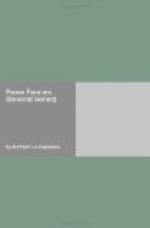Till one comes to think of it, one hardly realises how many important and pleasant things in life are yellow. Blue and green, no doubt, contract for the colouring of vast departments of the physical world. ‘Blue!’ sings Keats, in a fine but too little known sonnet—
’... ’Tis the life of
heaven—the domain
Of Cynthia—the
wide palace of the sun—
The tent of Hesperus, and all his train—
The bosomer of clouds, gold, grey, and
dun.
Blue! ’Tis the life of waters
...
Blue! Gentle cousin of the forest
green,
Married to green in all the
sweetest flowers.’
Yellow might retort by quoting Mr. Grant Allen, in his book on The Colour Sense, to the effect that the blueness of sea and sky is mainly poetical illusion or inaccuracy, and that sea and sky are found blue only in one experiment out of fourteen. At morning and evening they are usually in great part stained golden. Blue certainly has one advantage over yellow, in that it has the privilege of colouring some of the prettiest eyes in the world. Yellow has a chance only in cases of jaundice and liver complaint, and his colour scheme in such cases is seldom appreciated. Again, green has the contract for the greater bulk of the vegetable life of the globe; but his is a monotonous business, like the painting of miles and miles of palings: grass, grass, grass, trees, trees, trees, ad infinitum; whereas yellow leads a roving, versatile life, and is seldom called upon for such monotonous labour. The sands of Sahara are probably the only conspicuous instance of yellow thus working by the piece. It is in the quality, in the diversity of the things it colours, rather than in their mileage or tonnage, that yellow is distinguished; though, for that matter, we suppose, the sun is as big and heavy as most things, and that is yellow. Of course, when we say yellow we include golden, and all varieties of the colour—saffron, orange, flaxen, tawny, blonde, topaz, citron, etc.
If the sun may reasonably be described as the most important object in the world, surely money is the next. That, as we know, is, in its most potent metallic form, yellow also. The ‘yellow gold’ is a favourite phrase in certain forms of poetry; and ‘yellow-boys’ is a term of natural affection among sailors. Following the example of their lord the sun, most fires and lights are yellow or golden, and it is only in times of danger or superstition that they burn red or blue. And, if yellow be denied entrance to beautiful eyes, it enjoys a privilege which—except in the case of certain indigo-staining African tribes, who cannot be said to count—blue has never claimed: that of colouring perhaps the loveliest thing in the world, the hair of woman. Hair is naturally golden—unnaturally also. When Browning sings pathetically of ‘dear dead women—with such hair too!’ he continues:—
’What’s become of all the
gold
Used to hang and brush their bosoms’—




